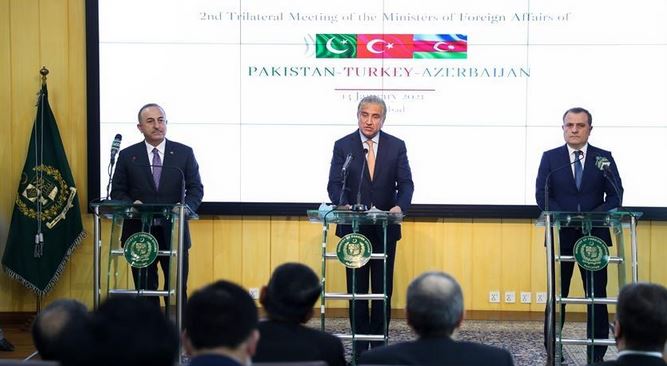India Turns Away From Pakistan, Turkey, And Azerbaijan: Economic Impact

Table of Contents
Diminishing Trade Relations with Pakistan, Turkey, and Azerbaijan
The decline in India's economic engagement with Pakistan, Turkey, and Azerbaijan reflects a broader strategic realignment. This section will explore the specific factors contributing to the weakening of these bilateral relationships.
The Decline in Bilateral Trade with Pakistan
The historical context of Indo-Pak trade is fraught with political tensions. These tensions, often escalating into periods of heightened conflict, have severely hampered the growth of bilateral trade. The current state of trade volume is significantly lower than its potential.
- Reduced trade in specific goods: Trade in agricultural products, textiles, and manufactured goods has been particularly affected. The imposition of non-tariff barriers further restricts the flow of goods.
- Quantitative data on trade decline: Data from the past decade reveals a consistent downward trend in bilateral trade between India and Pakistan, highlighting the negative impact of political instability. (Specific data points would be included here, sourced from reliable statistics portals).
- Non-tariff barriers: Restrictions on cross-border movement of goods, complex customs procedures, and political uncertainties contribute significantly to hindering trade between the two nations.
Strained Economic Ties with Turkey
India-Turkey economic relations have faced increasing strain in recent years. Geopolitical considerations, coupled with competitive market dynamics, have played a crucial role in this decline.
- Decreased investment from Turkey in India: The number of Turkish investments in India has decreased, reflecting a shift in Turkey's investment priorities towards other regions.
- Changes in trade agreements: While past trade agreements existed, their impact has been limited by the aforementioned geopolitical factors and the changing global economic landscape.
- Impact on tourism: Political tensions have also impacted tourism flows between the two countries, affecting another vital aspect of their bilateral economic relationship.
Shifting Focus from Azerbaijan
India's engagement with Azerbaijan, particularly in the energy sector, has seen a shift in recent years. This is primarily due to India's efforts to diversify its energy sources and explore alternative investment opportunities.
- Reduced investments: While India has historical investments in Azerbaijan's energy sector, the scale of new investments has decreased significantly as India looks towards other partners.
- Changes in energy import strategies: India is increasingly focusing on securing energy supplies from other regions, reducing its dependence on Azerbaijan.
- Alternative partnerships: India has actively pursued partnerships with other countries in Central Asia and the Middle East to bolster its energy security.
India's Pursuit of New Economic Partnerships
Faced with challenges in traditional partnerships, India is actively pursuing new economic relationships, prioritizing diversification and regional stability.
Strengthening Ties with Central Asia and the Far East
India's engagement with Central Asian nations and the Far East is expanding rapidly. This involves increased trade, investment, and infrastructure development.
- New trade agreements and projects: India has signed several trade agreements and initiated several infrastructure projects with countries in Central Asia and the Far East. (Specific examples and details would be included here).
- Increased investment in infrastructure and energy sectors: Significant investment is flowing into infrastructure development and energy projects in these regions, further strengthening economic ties.
Focus on Regional Trade Agreements
India’s participation in regional trade blocs such as RCEP (if applicable) aims to reduce reliance on specific partners by integrating into larger, more diversified markets.
- Benefits of RCEP (or other relevant agreements): Membership in these blocs offers access to larger markets, reducing dependence on any single nation and fostering greater economic resilience. (Specific benefits of the agreement relevant to this context would be discussed here).
Promoting "Make in India" and Atmanirbhar Bharat
The "Make in India" initiative and the broader "Atmanirbhar Bharat" (self-reliant India) policy aim to boost domestic manufacturing and reduce import dependency.
- Sectors benefiting from the initiative: This initiative is targeting various sectors like manufacturing, technology, and pharmaceuticals, fostering domestic growth and self-sufficiency.
- Impact on job creation: The initiative aims to create millions of jobs, fostering economic empowerment and reducing reliance on foreign labor.
- Reduction of import dependency: By promoting local production, India is aiming to reduce its reliance on imports, strengthening its economic sovereignty.
Geopolitical Implications and Regional Stability
India's economic diversification carries significant geopolitical implications, impacting regional dynamics and global power balances.
Impact on Regional Geopolitics
India's shift away from certain partners is reshaping the regional power dynamics, potentially leading to new alliances and strategic partnerships.
- Regional power dynamics: This shift may lead to increased influence from other major powers in the region, altering regional balance of power.
- Potential shifts in alliances: India's re-alignment of its economic focus could result in strengthening ties with other nations and formation of new alliances.
- Implications for regional stability: The economic restructuring could positively impact regional stability by promoting cooperation and interdependence among nations.
The Role of International Relations
Global events and international relations significantly impact India's economic strategy, shaping its decisions and alliances.
- Global events impacting India's decisions: Major global events like trade wars and pandemics influence India's economic priorities and foreign policy decisions.
- Influence of major powers on regional alliances: The influence of major global players like the US, China, and Russia shapes India's alliances and strategic choices.
Conclusion
India's economic diversification, characterized by a strategic shift away from Pakistan, Turkey, and Azerbaijan, presents significant implications for regional stability and global trade. This move, driven by a complex interplay of geopolitical factors and economic priorities, underscores India's commitment to strengthening its economic independence and pursuing more diversified partnerships. The "Make in India" initiative and engagement with new partners in Central Asia and the Far East highlight India's ambition to achieve greater self-reliance and foster sustainable economic growth. The long-term consequences for all nations involved are still unfolding, but the shift marks a significant turning point in the geopolitical and economic landscape of the region. Further research on India's economic diversification strategy is crucial to understanding this evolving landscape and its impact on global trade. Stay informed about the unfolding economic impact of India's changing relationships with Pakistan, Turkey, and Azerbaijan to gain a deeper understanding of this significant strategic shift.

Featured Posts
-
 Recurring Issue Prompts Calls For Jenna Bush Hagers Today Show Role Adjustment
May 18, 2025
Recurring Issue Prompts Calls For Jenna Bush Hagers Today Show Role Adjustment
May 18, 2025 -
 Today Show Viewers Demand Permanent Change After Jenna Bush Hager Segment
May 18, 2025
Today Show Viewers Demand Permanent Change After Jenna Bush Hager Segment
May 18, 2025 -
 2 2011
May 18, 2025
2 2011
May 18, 2025 -
 Eurovision 2025 Damiano David Rumoured As Guest Performer
May 18, 2025
Eurovision 2025 Damiano David Rumoured As Guest Performer
May 18, 2025 -
 Analysis Trumps 30 Tariffs On China Remain Until Late 2025
May 18, 2025
Analysis Trumps 30 Tariffs On China Remain Until Late 2025
May 18, 2025
Latest Posts
-
 Amanda Bynes And Taran Killam A Look Back At Their Relationship
May 18, 2025
Amanda Bynes And Taran Killam A Look Back At Their Relationship
May 18, 2025 -
 Amanda Bynes Former Classmate Details Troubling Past Behavior
May 18, 2025
Amanda Bynes Former Classmate Details Troubling Past Behavior
May 18, 2025 -
 Amanda Bynes Only Fans A Deep Dive Into The News
May 18, 2025
Amanda Bynes Only Fans A Deep Dive Into The News
May 18, 2025 -
 6 4 Win For Dodgers Confortos Home Run Seals The Deal
May 18, 2025
6 4 Win For Dodgers Confortos Home Run Seals The Deal
May 18, 2025 -
 Only Fans Amanda Bynes Surprising Announcement And Its Implications
May 18, 2025
Only Fans Amanda Bynes Surprising Announcement And Its Implications
May 18, 2025
